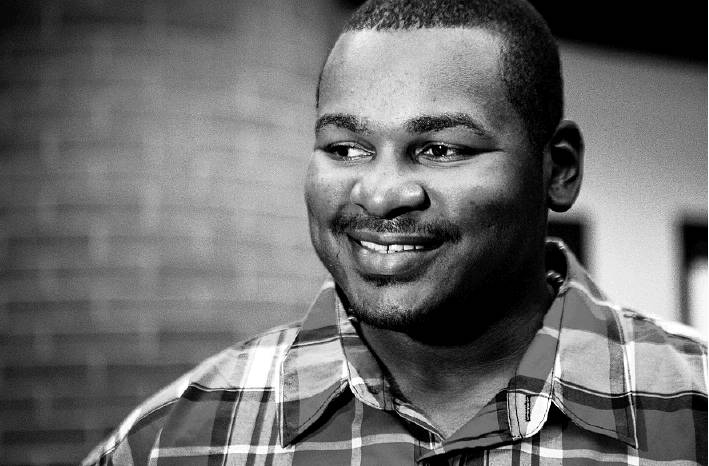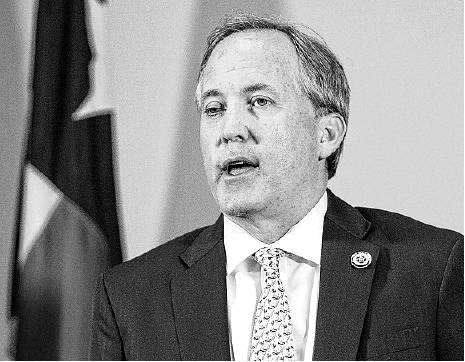AG urged state not to compensate ex-inmate
Paxton doubted innocence of death row prisoner who was wrongfully convicted
By Keri Blakinger STAFF WRITER
Texas Attorney General Ken Paxton urged state officials to deny compensation to wrongfully convicted former death row inmate Alfred Dewayne Brown, saying he still had questions about Brown’s innocence and arguing that aco-defendant may have been bribed to change his story, according to records obtained by the Houston Chronicle.
In a six-page letter to the Texas Comptroller of Public Accounts, Paxton —who is under criminal indictment himself arising from a securities fraud case — outlined four reasons why Brown wasn’t entitled to money for his time behind bars, even though a Harris County judge found him “actually innocent” earlier this year. One week after receiving the June 17 letter, Comptroller Glenn Hegar rejected Brown’s application for compensation from the state.
“There remains credible evidence that Mr. Brown killed Houston Police Officer Charles Clark,” Paxton wrote to Hegar in the letter, which was obtained by the Chronicle this month. “There is ample basis to deny Mr. Brown’s claim for a $2 million payment.”
The letter doesn’t detail what that evidence is, and Paxton’s office did not respond to the Chronicle’s request for comment. It’s not clear whether the comptroller asked the attorney general to weigh in with legal advice.
Meanwhile, Brown’s defense team, the Harris County District Attorney’s office and the special prosecutor whom she hired all panned the letter, disputing some of its claims.
“It’s full of hearsay and unauthenticated sources which are outside the trial record, the habeas record and all the record,” District Attorney Kim Ogg said. “He’s inserted himself into a case where he has no jurisdiction — I think it’s improper, and I was surprised.”
In 2005, Brown was sentenced to death after he was convicted of killing Clark in a brazen daytime store robbery two years earlier. The botched heist at Ace America Check Cashing on South Loop 610 East also left store clerk Alfredia Jones dead; two other men went to prison for their roles in the slayings. One — Elijah “Ghetto” Joubert — is still on death row, while the other is serving a 30-year sentence in a North Texas prison.
Brown, however, always maintained his innocence, and he was freed in 2015 after a police investigator uncovered phone records in his garage that defense lawyers said corroborated Brown’s alibi. Then-District Attorney Devon Anderson said she didn’t have enough evidence to retry him — though she never said Brown was “actually innocent,” a finding that would have been required for him to get state compensation.
Two years later, Brown’s attorneys filed a lawsuit demanding money for Brown’s time in prison, while also fighting for a declaration of actual innocence that would entitle him to state compensation. Last year, Ogg hired special prosecutor John Raley to reinvestigate the case and early this year asked a local judge to amend the court’s earlier dismissal to include the words “actual innocence.”
But for Paxton —and skeptical police union officials, who’ve repeatedly raised concerns about Raley’s 179-page report — that wasn’t enough.
“The special prosecutor’s report was based in part on a changed witness statement from a co-defendant on death row,” Paxton wrote, pointing out that Joubert alleged to police in 2015 that Brown’s defense team offered him $2,000 to change his story to help their client.
“That act is the subject of a live criminal complaint,” Paxton wrote.
When the Republican attorney general penned his letter in June, investigators with the prison system’s Special Prosecution Unit had just begun looking into Joubert’s claims — which were already four years old and well past the statute of limitations for pressing charges on the bribery claim.
“Those lawyers played me,” Joubert said, according to a recording of the interview obtained through a records request. “They promised to give me some money. His lawyers … promised to give me $2,000 for my affidavit.”
But this year, Joubert refused to talk to authorities, and ultimately, according to SPU executive director Jack Choate, prosecutors decided not to pursue charges in light of concerns about both the statute of limitations and the credibility of the condemned killer’s allegations.
“AG Paxton either failed to read my report or is intentionally misquoting it,” Raley said. “None of my conclusions were based on the constantly changing stories of Joubert.”
The attorney general’s letter also raises questions about Brown’s “actual innocence” by arguing that the potentially exonerating phone records could in fact be proof of his guilt. While the records could show that Brown made a phone call from his girlfriend’s house as he always maintained, Paxton —echoing arguments raised last year by the Harris County Attorney’s Office in response to Brown’s lawsuit — said it was a three-way call that could just as easily show Brown was with the killers at the time.
Aside from raising concerns about the phone call, the existence of “credible evidence” and the bribery allegations, Paxton again brought up a legal question that’s been plaguing the case for the past few months: Did a Harris County judge have the authority to reopen an already dismissed case in order to declare Brown “actually innocent”?
After two months of wrangling with the legal implications, state District Judge George Powell in May decided that he did have jurisdiction to make that decision. But the comptroller, after fielding Paxton’s letter, disagreed.
To police union officials, who have repeatedly asserted Brown’s guilt, Paxton’s decision to weigh in came as a long-awaited vindication of their belief that they’d always had the right man.
“We’re very pleased that another set of real investigators looked at this case,” said former union president Ray Hunt, “and agreed with us that Alfred Dewayne Brown is not actually innocent.”
Neal Manne, the high-profile Houston attorney representing Brown in his efforts to get state compensation, was unfazed and promised to appeal the comptroller’s June decision.
“I am not surprised by the letter, because I fully expected that there would be secret attempts to corrupt the process at the comptroller’s level,” he said. “Fortunately, the compensation statute permits the ultimate decision to be made by the Texas Supreme Court, which will be our next step.”
Paxton, who was re-elected last year, was indicted in 2015 by a grand jury in Collin County after being charged with two counts of first-degree felony securities fraud and a third-degree felony of failing to register with the state as an investment adviser. The two-term attorney general has maintained his innocence and called the case a witch hunt. keri.blakinger@chron.com

